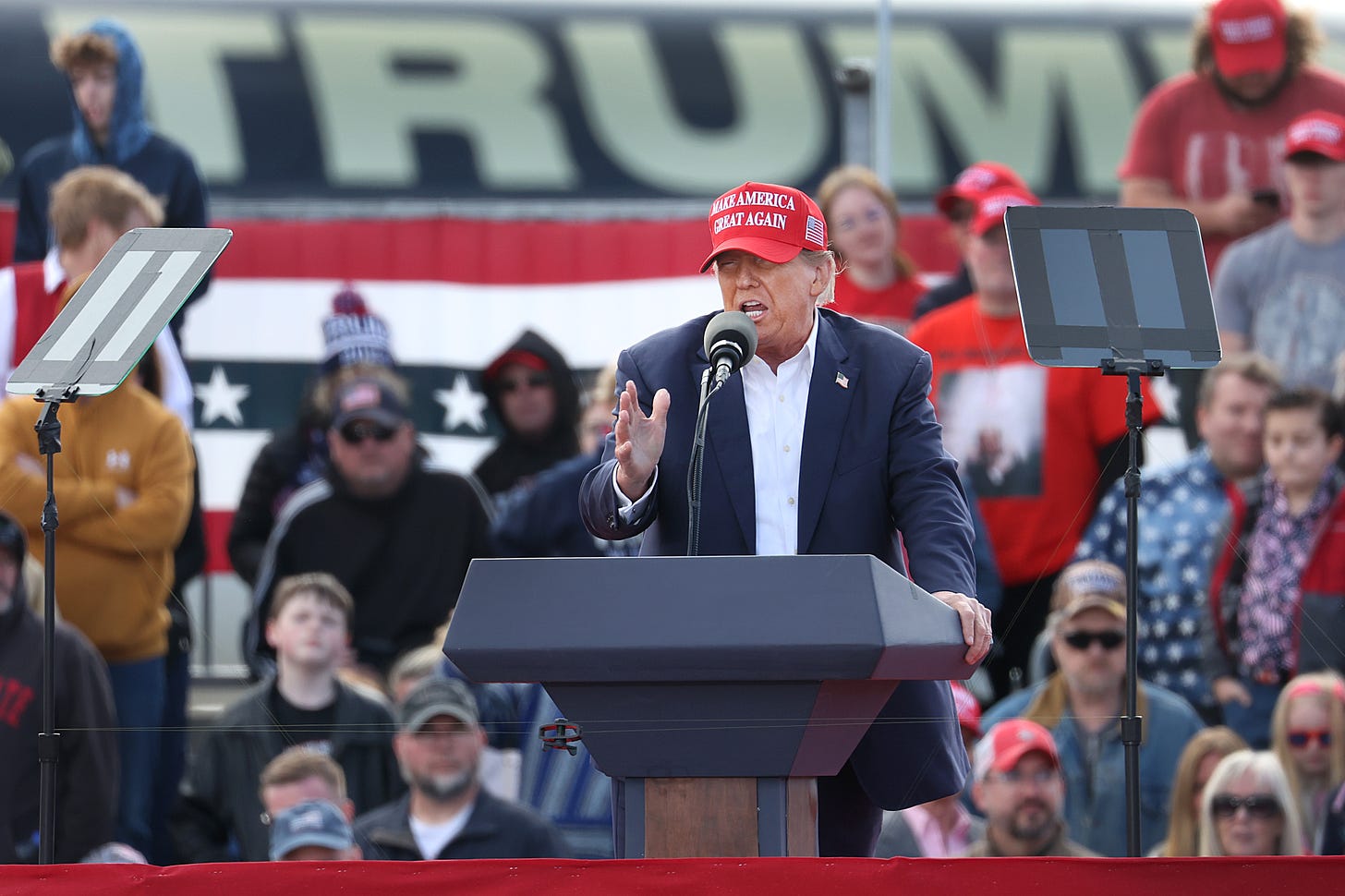Trump's 'bloodbath' threat — and campaign coverage that doesn't work
Plus, a book, a film and a song
During the 2016 presidential campaign, there was a debate about whether to take Donald Trump seriously or literally. It started with political journalist Salena Zito, who was covering voters in the Midwest, writing in the Atlantic that the media gets it wrong about Trump: “the press takes him literally but not seriously; his supporters take him seriously but not literally.” Heartland wisdom? Press criticism? Hard to say, but it inspired a lot of talk and hand-wringing.
As Jon Allsop put it in Columbia Journalism Review: “The literally/seriously motif has echoed, Zelig-like, through the press. We’ve heard of Trump being taken seriously and literally, seriously but not literally, and neither seriously nor literally.”
Eight years later, these distinctions don’t matter much, if they ever did. Trump says a lot of crazy, troubling things; and he does a lot of crazy, troubling things. If you’re not taking that very seriously, you’re not doing your duty as an American citizen.
A few days ago, as you probably know, Trump made a prediction during a rally in Dayton, Ohio, while talking about the automobile industry: “Now, if I don’t get elected, it’s going to be a bloodbath for the whole – that’s going to be the least of it. It’s going to be a bloodbath for the country.”

Was he talking about potential job losses or was he promising more violence along the lines of the Jan. 6, 2021 riot at the Capitol?
Another round of seriously/literally has followed. MSNBC’s Joe Scarborough tweeted — then deleted — a Jan. 6 photo with the comment that Trump “promised another ‘bloodbath’ if he loses again.” That suggested he was backtracking in tying the bloodbath comment to violence at the Capitol. But Morning Joe has since set out to prove, by referring to past Trump statements, that he was right to begin with. Meanwhile, Trump’s Republican allies claimed to be terribly upset that the media was irresponsibly taking the bloodbath comment out of context; they made the disingenuous case that he wasn’t advocating or predicting violence but only talking about the economics of the car industry.
Trump has a particular ability to say outrageous things that — because of his free-form (often unhinged) speaking style — can be taken in all kinds of ways. It’s pointless to debate precisely what he meant in a particular phrase or at a particular rally.
Report it? Certainly. As Hawaii senator Brian Schatz aptly put it, “Headline writers: Don’t outsmart yourselves. Just do ‘Trump Promises Bloodbath if He Doesn’t Win Election.’” That is simply true, and it’s inarguable. Separately, Schatz posted, “Promising a bloodbath is disqualifying. He needs to lose.”
A lot of things should have disqualified Trump by now. And he keeps doing more of them — apparently with impunity, at least from his die-hard followers. He also, at that Dayton rally, saluted while playing an alternative national anthem, with a backdrop featuring the Jan. 6 insurrectionists whom he has said he’ll pardon immediately if elected. Talk about disqualifying.
This is my take, and my boldface type: The legitimate media needs to figure out how to get across clearly to the voting public — the ones that matter in the handful of swing states that will decide the election — the consequences of electing Trump again.
I don’t think that is happening right now. The mainstream press is giving us far too much horserace coverage; far too much emphasis on meaningless national polls; far too much repetition about President Biden’s age and gaffes; and a whole lot of false equivalency created between these two wildly different candidates. And yes, far too much pointless debate about how seriously to take Trump’s individual utterances.
But will that more meaningful coverage happen? I have serious doubts. There seems to be no desire to change.
Yet Trump is a far more dangerous threat than he was in 2016. He and his allies have figured out how to kick down the guardrails that kept democracy more or less functioning during his four-year term and in its aftermath.
I would appreciate hearing your thoughts on all of this in the comments. What do you think of the political coverage you get?
Thanks very much for subscribing and caring about these issues. The most consequential election in American history is just over seven months away. If you happen to be in New York City on April 1, please sign up for a panel I’ll be moderating at Columbia University: “Democracy on the Brink: Is the Press Up to the Task?” It will be recorded and eventually available to all, and I’ll post that link here.
And before I sign off, I’ll share my most recent Guardian column, about a terrible one-year anniversary — journalist Evan Gershkovich was unjustly jailed in Russia on March 29 last year. Putin’s regime calls him a spy, and there’s no reason whatever to think that’s true. He was reporting for the Wall Street Journal; journalism is not a crime. My column makes reference to, but doesn’t include this photograph.

Separately, on the culture front, a movie I loved, a book I enjoyed, and a song I rediscovered.
The movie: Anatomy of a Fall. I’m a sucker for a good courtroom thriller and this 2023 French film from director Juliet Triet, which won the Oscar this month for best original screenplay, is a great one. (Note: It’s available for streaming for a couple more days on Prime Video or Apple TV+; but after March 22, it will be available only on Hulu.) Enjoy — but don’t expect any definitive answers about the plot.
The book: Kafka Was the Rage: A Greenwich Village Memoir, by Anatole Broyard. I came across this slender paperback recently on a “staff favorites” table at the Strand bookstore. Broyard was a book critic and editor at the New York Times; this captivating unfinished memoir was published in 1993, three years after his death. The author’s voice is mesmerizing and distinctive as he writes about his experiences — literary and social — in post-war Manhattan.
And the rediscovered song: “Bad to Me,” written by John Lennon, became a top hit for Billy J. Kramer and the Dakotas in early 1963. That version is fine, but the Beatles version, released as a bootleg decades later, is eons better. That this was a throwaway, written in a heartbeat for another artist, says it all about the Beatles’ storehouse of talent.






The New York Times, Washington Post, and Wall Street Journal receive most of the attention from their journalistic malpractice—but USA Today/Gatehouse, papers who reach a lot of small and mid-sized cities, are sanitizing or omitting stories like the "bloodbath speech" that explain the ultra-high stakes of this election as well. They deserve to earn more of our critical floodlight and pressure as well.
I think almost more frightening than the "blood bath" comments, which Trump and his allies have tried to walk back, is his comment on what happens if he loses in 2024, as reported by NYT:
“I don’t think you’re going to have another election, or certainly not an election that’s meaningful,” he said.